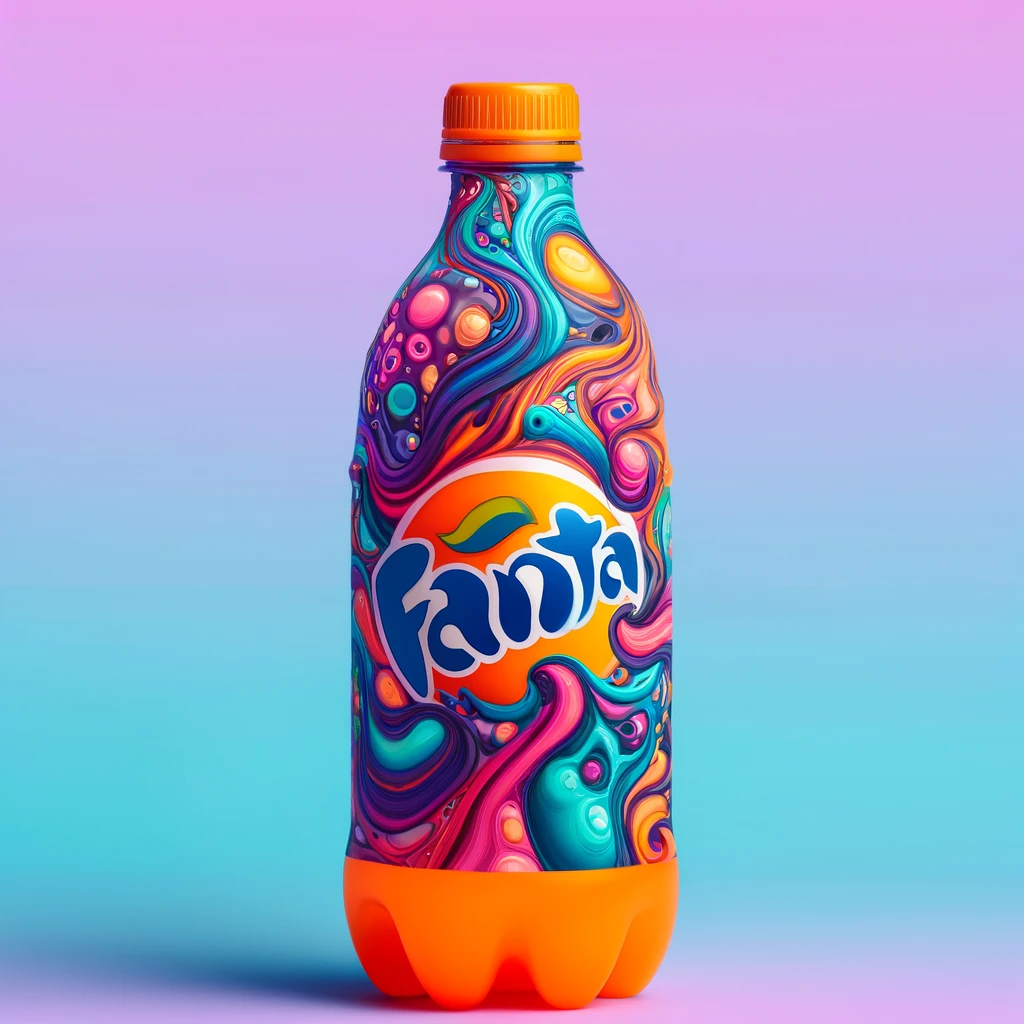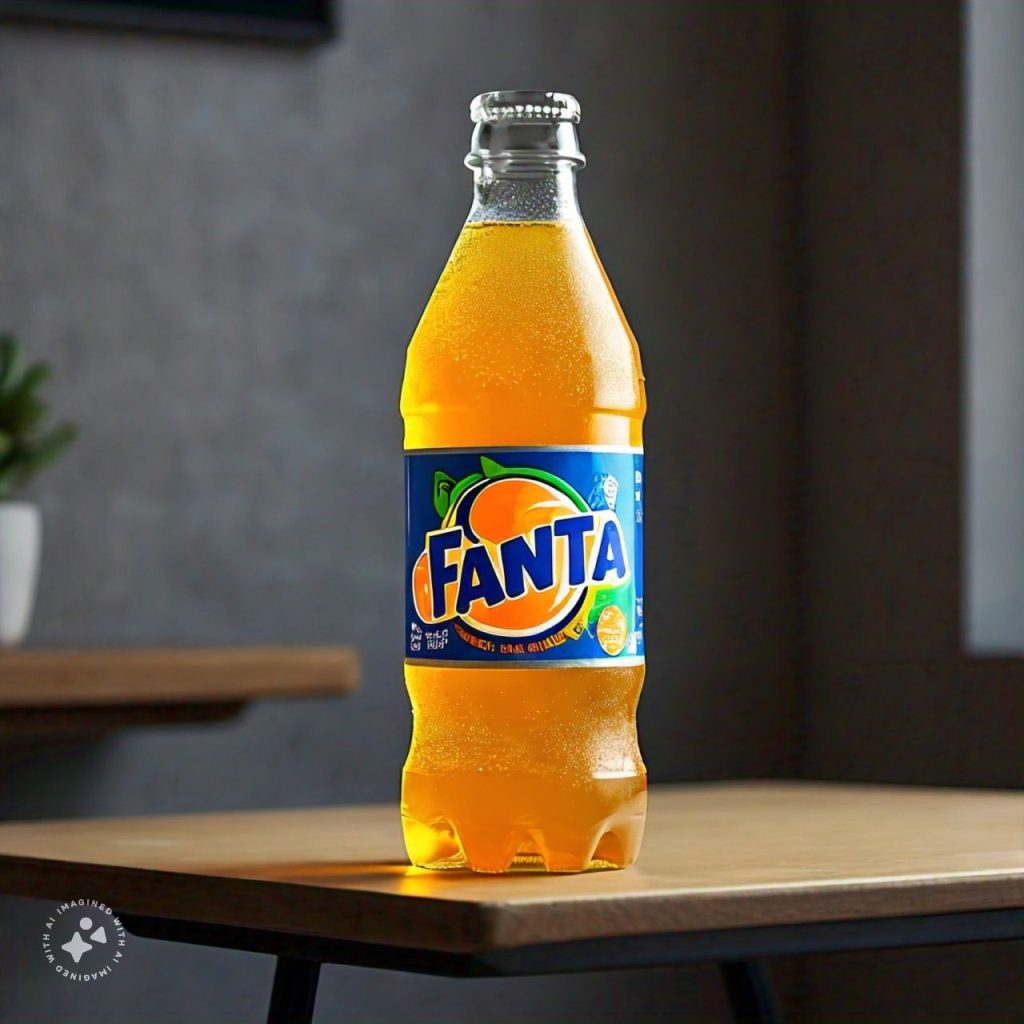Fanta’s selection of real fruit flavors offers a satisfying and fizzy taste without the added caffeine. Made from all-natural ingredients, it appeals to a wide range of preferences. Is Fanta caffeine-free?
The Origins of Fanta: Innovation Amidst Adversity
Fanta’s name, derived from the German term “Fantasie,” which translates to imagination, is a nod to its innovative beginnings during a challenging period in history, specifically the resourcefulness needed to navigate the shortages experienced in World War II.
In 1940, Coca-Cola’s German branch was hit hard by wartime embargoes that restricted their access to key ingredients like sugar and certain flavorings needed to make the classic Coke. This pushed Max Keith, a central figure in the branch, to guide chemists toward creating an entirely new beverage. They made the most of what was available, using fruit pulp and whey, a byproduct from cheese production, to craft this new drink.
Fanta’s launch during wartime was a major success, with sales exceeding 3 million units. Once the conflict ended and Allied forces took control of German facilities, Keith ensured a smooth transition by incorporating Fanta’s recipe into Coca-Cola’s range, enriching their beverage options.
The globally adored Fanta Orange was introduced in Italy in 1955, crafted with locally sourced citrus for an authentic, refreshing flavor. This significant milestone marked the beginning of Fanta’s transformation into the iconic brand we know and love today.
Comparing Caffeine: Fanta And Other Coca-Cola Beverages
Analyzing the caffeine levels in Coca-Cola’s assortment of beverages offers an in-depth look at where Fanta aligns within the range. This review utilizes the standard 12-fluid-ounce serving size for uniformity.
- Fanta: 0 mg
- Coke: 34 mg
- Diet Coke: 46 mg
- Coke Zero: 34 mg
- Barq’s Root Beer: 22 mg
- Fresca: 0 mg
- Sprite: 0 mg
This comparison reveals that Fanta, Fresca, and Sprite are entirely devoid of caffeine, providing a perfect alternative for those seeking a non-caffeinated drink. In contrast, Coke, Diet Coke, and Coke Zero vary in their caffeine content, catering to different preferences for a boost.
Is Fanta Orange Healthy?

Fanta Orange’s health impact is largely due to its high sugar content. A 12-ounce can contain 73 grams of sugar, mainly from high fructose corn syrup, which can contribute to health issues such as weight gain and increased risk of diabetes.
According to the American Heart Association, men should consume no more than 36 grams of sugar each day, while women should limit their intake to 25 grams. Drinking one can of Fanta Orange, which contains about 44 grams of sugar, clearly exceeds these recommended daily amounts.
A regular diet containing high fructose corn syrup is known to contribute to several negative health outcomes, including:
- Obesity
- Diabetes
- Heart disease
- Liver disease
- Tooth decay
For those wanting a sugar-free option, Fanta Orange Zero Sugar provides a tasty alternative using aspartame as a sweetener, which the FDA has confirmed is safe.
Fanta Nutritional Overview

Knowing the nutritional content of soft drinks is key to making healthier choices. Fanta provides a range of flavors, each with its own nutritional profile. For precise information, refer to the labels of each specific variant.
Enjoy Fanta’s vibrant, delicious beverages with every sip! Indulge in 90 to 160-calorie options without worrying about fat. These drinks provide low sodium levels (35-65 mg), while the delightful fruity taste comes from 22 to 40 grams of sugar and 24 to 44 grams of carbs per serving. Embrace the refreshing experience with almost no protein!
Analyzing Fanta In The Landscape Of Carbonated Drinks
Fanta stands out in the lively market of sodas as a top option for those steering clear of caffeine. Let’s take a closer look at how its caffeine content stacks up against other popular sodas:
- Fanta: 0 mg
- Coca-Cola: 34 mg
- Pepsi-Cola: 38 mg
- Mountain Dew: 54 mg
- Dr Pepper: 41 mg
- Sprite: 0 mg
- 7-Up: 0 mg
Fanta stands out as a caffeine-free, bubbly, fruity option among sodas. While refreshing, remember that sugar content can differ depending on the chosen flavor and brand.
Maximize your health knowledge—check the product’s label and ingredients for precise nutritional information.
Understanding Fanta’s Caffeine-Free Nature
Fanta has thoughtfully established itself as a caffeine-free soda based on several key factors:
Broader Appeal: By offering a caffeine-free option, Fanta appeals to a wider range of consumers, including those who avoid caffeine for health or personal reasons. This inclusivity enhances its popularity among diverse groups.
Emphasis on Flavor: Fanta’s signature lies in its vibrant fruit flavors. The lack of caffeine preserves the integrity of these flavors, offering an untainted taste that highlights the drink’s fruity essence.
Brand Identity: Embrace the lively energy of Fanta without the crash! Enjoy the refreshing, caffeine-free taste that keeps you going all day long.
Exploring Caffeine-Free Soda Alternatives To Fanta
Fanta is a well-liked option for those steering clear of caffeine, yet there is a diverse selection of other caffeine-free carbonated drinks in the market that cater to different tastes and preferences.
Sprite: Indulge in the crisp, clean taste of this lemon-lime soda! Opt for Sprite for a caffeine-free treat that’s perfect for anyone seeking a refreshing, light beverage.
7UP: Similar to Sprite, 7UP combines a caffeine-free lemon-lime flavor with a clean, refreshing, and bubbly drinking experience.
Sierra Mist: Sierra Mist embodies a refreshing lemon-lime flavor with a smooth finish, catering to those who enjoy a sharp, tangy taste without caffeine.
Mug Root Beer: Mug Root Beer offers a smooth transition from the citrus category, providing a caffeine-free drink with a rich, creamy flavor. This beverage is a delightful option for those who enjoy root beer and prefer caffeine-free choices.
These beverages provide a broad selection for those looking for caffeine-free alternatives to Fanta. They offer a delightful range of fizz and flavor, appealing to diverse taste preferences.
Final Thoughts Does Fanta Have Caffeine?
For those who want a break from water, Fanta offers a caffeine-free choice. However, its high sugar content can lead to weight gain, dental problems, and chronic health issues like diabetes.
Fanta Orange Zero Sugar is a healthier option with aspartame, but for those unsure about artificial sweeteners, water or natural orange juice might be safer. Citrus flavor enthusiasts can enjoy their drink without health concerns.
FAQS: DOES FANTA HAVE CAFFEINE?
Q: Is Fanta better than Coke?
Deciding whether Fanta is better than Coca-Cola comes down to personal taste. Both are popular sodas from The Coca-Cola Company, each offering distinct flavors for different preferences.
Q: Is it OK to drink Fanta every day?
Should you drink Fanta every day? Regularly drinking soda, including Fanta, isn’t advised due to its high sugar content. Frequent consumption can lead to health issues like obesity, diabetes, high blood pressure, and heart problems. This caution also applies to diet sodas and other sugary drinks.
Q: Why is Fanta called Fanta?
The name “Fanta” comes from a challenge to name the drink. Inspired by Keith’s call to use their imagination, salesman Joe Knipp suggested “Fanta.” After the war, Coca-Cola brought Fanta to the U.S. and trademarked the name in 1960.
Q: What is the benefit of Fanta?
Fanta, especially the orange flavor, is a refreshing drink that can provide some vitamins and minerals. It’s a good option for rehydrating during sports or physical activities.
Q: Is Fanta good for kids?
Sugary drinks like Fanta are not ideal for kids. It’s better to focus on whole fruits and vegetables rather than fruit juices. If juice is given, it should be limited to ½ cup of no-added-sugar variety, only on occasion.
Q: Is Fanta good in the body?
Soda, including Fanta, generally isn’t healthy because of its high sugar content. Regular consumption can lead to weight gain, diabetes, and heart problems. Consider healthier drink options instead.
Q: Can Fanta hydrate you?
Fanta and similar drinks aren’t great for hydration. Though they may contain electrolytes, their high sugar and caffeine content can work against proper hydration. Sugar pulls water from the body into the bloodstream, and caffeine increases urination, potentially causing dehydration.
Q: What are the ingredients in Fanta UK?
Fanta UK contains carbonated water, sugar, 3.7% orange juice from concentrate, 1.3% citrus fruit from concentrate, citric and malic acids, color from carrot and pumpkin extracts, sweeteners like acesulfame K and sucralose, potassium sorbate as a preservative, sodium citrates for acidity regulation, guar gum as a stabilizer, and natural orange flavor.
Q: How much caffeine is in a Fanta lemon?
Fanta Lemon uses only natural flavors and fruit juice and contains no caffeine.
Q: Is Fanta drink good for health?
High-sugar drinks like Fanta can negatively impact health. They can increase the risk of cavities, heart disease, and metabolic problems like type 2 diabetes.
Q: Is Fanta better than Coke?
Choosing whether Fanta or Coca-Cola is better depends on personal taste. Both are popular sodas from The Coca-Cola Company, each offering distinct flavors and qualities for different preferences.
Q: Does Fanta have alcohol in it?
Surprisingly, many soft drinks, including Fanta, may contain trace amounts of alcohol, usually less than 0.01%. This can vary across brands and types, even with sugar-free options.
Read More On: TechNewzart

